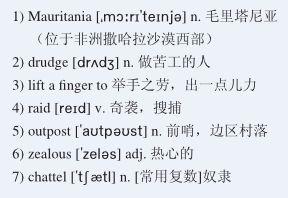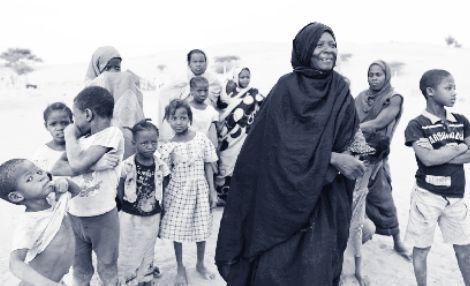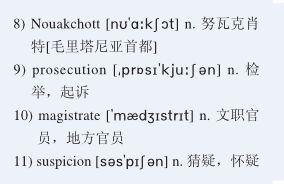毛里塔尼亚:撒哈拉的奴隶在哭泣
2013-07-17byMonicaMark
by Monica Mark



Mbarka Mint Aheimed first met her father on the day he forced her into slavery. The man who dragged her from her mother when she was five-year-old needed “a 2)drudge” in his wifes mansion.
“Because my mother was her husbands slave, his wife saw us all as personal property. It was completely normal for her to do what she wanted with us,” Aheimed would later tell antislave activists in Mauritania. Living in a tiny hut, open to the fierce heat of the orange dune-swept deserts, she worked from dawn to dusk. For 15 years, she never had a day off. “The family lived in a mansion, but I was the only person who 3)lifted a finger to work.” she said.
Once she was old enough to start covering her head—but forced, against tradition, to leave her arms bare to carry out heavy lifting—one of the slaveowners sons drove her miles into the desert and raped her. Later he would only take her far enough to collect firewood for making tea on their return.
玛卡·米恩特·安赫米德第一次见到自己的父亲是在他逼她为奴的那天。在她五岁那年,她父亲妻子家中需要一名苦工,他便把她从生母那里拽走,她从此被迫沦为奴隶。
“因为我母亲是我爸的奴隶,他的正室便视我们为其个人财产。他的妻子想对我们做什么就做什么,那都是完全正常的,”安赫米德后来对毛里塔尼亚的废奴运动者这么说。她住在一个窄小的棚屋里,承受着满布沙丘的黄色沙漠里的酷热,每天起早贪黑地干活。15年来,她从没休息过一天。“他们一家子都住在一个大屋子里,但只有我一个人干活。”她说道。
当她到了一定年龄,需要开始戴头巾时,她却不得不,反传统地,赤裸着双臂,来干粗重活。这个奴隶主的其中一个儿子把她载到几英里外的沙漠中,强暴了她。之后,他只会是又把她带到足够远的地方捡木柴,好让他们回去的时候有柴火沏茶。
Aheimeds story isnt uncommon. In 1981 Mauritania became the last country to abolish slavery, although it was only criminalised in 2007. Officials repeatedly denied it existed and refused to talk about slavery. But activists and former slaves spoke of a centuries-old practice, a relic of the trans-Sahara slave trade, when Arabic-speaking Moors 4)raided African villages, flourishing in remote 5)outposts of this vast desert country.
A rigid caste system that favours those of“noble-birth”, and 6)zealous efforts to brand the country an Arab republic, concentrates power and wealth among the overwhelmingly lighterskinned Moors, leaving slave-descended darkerskinned Moors and black Africans on the edges of society. Up to 800,000 people in a nation of 3.5 million remain 7)chattels, according to activists who routinely document cases like Aheimeds.
But slavery is often harder to pin down. With almost half the population living on less than $2 a day, many slaveowners work alongside their slaves.
Boubacar Messaoud grew up in a grey area between slavery and freedom, paid a token salary in return for farming. “One day when we were about seven, the slaveowners son, whose name was also Boubacar, said I should be called Boubacar abd [the black slave], so people didnt confuse us. That was when I understood.”
安赫米德的故事并不少见。1981年,毛里塔尼亚成为最后一个废除奴隶制的国家,尽管蓄奴在这个国家直到2007年才被认定为违法。政府官员屡次否认奴隶制的存在并拒绝谈论此话题。但是废奴运动者和曾当过奴隶的人都在讲着这种沿袭了好几百年,因跨撒哈拉沙漠奴隶交易而生的旧习,那时,说阿拉伯语的摩尔人突袭非洲人的村落,在这个广阔的沙漠国家的边陲上落地生根。
严格的等级制度有利于那些“生而高贵”且热衷于把国家打造成一个阿拉伯共和国的人,权力和财富都集于占大多数的浅肤色摩尔人身上,把沦为奴隶的深肤色摩尔人和非洲黑人弃置于社会的边缘。根据定期对类似安赫米德的案例进行文档记录的废奴运动者所述,在这个拥有350万人口的国家里,多达80万的人口是奴隶。
但是,奴隶制经常很难受到制约。这个国家近乎一半的人口每天收入不足两美元,很多奴隶主和他们的奴隶一起工作。
巴布卡·米沙奥德在奴隶和自由身份的灰色地带之间长大,干农活换取象征性的薪水。“在我们大约七岁那年,有一天,奴隶主的儿子,他也叫巴布卡,说我应该叫做黑人奴隶巴布卡,这样人们才不会认错我俩的身份。我是那时候开始明白自己是奴隶的。”
And many do not identify themselves as slaves.“When people talk of slavery, they talk of chains, prisons, and threats. That was the slavery of those who had known liberty—the Africans who jumped into the sea rather than be enslaved in America,”said Messaoud, who founded the abolitionist organisation SOS Slaves. “Today we have the slavery American plantation owners dreamed of. Slaves believe their condition is necessary to reach paradise.”
Thirteen years after slavery was abolished, SOS Slaves began holding secret meetings beneath rugs to muffle voices, in moonlight on the flat rooftop of a building in 8)Nouakchott. Messaoud and his co-founder, a “noble” who had chosen a slave as a seventh birthday gift, were harassed and imprisoned. Even today, state agents lurking outside the building trail visitors afterwards.
Family members initially voiced opposition, too. “My mother believed she was protecting me when she reminded me that I was a slave—that I shouldnt forget my place,” Messaoud said.
Statistics paint a bleak—and complicated—picture. A judge told us Mauritania is unlikely to improve on its record of one successful 9)prosecution anytime soon: “[Recently] three runaway children overheard me saying we had to imprison their master. They immediately started crying in horror. They suddenly changed their story, they said he always treated them well, fed them, sheltered them. They wanted to go back with him.”
Some former slaves like Malaka, 28, tended to his owners goats unsupervised for weeks at a time in the desert. “I didnt want to leave because I was scared to leave my family behind. And I was scared because I had heard about money, but I had never seen it in my life,” he said.
还有很多人不认为自己是奴隶。“当人们谈及奴隶制时,提的都是锁链、牢房、胁迫什么的。这就是懂得自由的人们所知道的奴隶制——非洲人宁愿跳海也不愿意在美洲被奴役,”米沙奥德说道,他成立了废奴组织——奴隶救援组织。“如今,这种状况是美洲庄园奴隶主梦寐以求的。奴隶认为自己的处境是以后能够上天堂的必经之路。”
奴隶制被废除的13年后,奴隶救援组织开始在努瓦克肖特一座建筑的平屋顶上借着月色,在毯子的遮盖下低声细语地举行秘密会议。米沙奥德和组织的共同创立者——一位在七岁时挑选过一名奴隶作为生日礼物的贵族,他们曾备受阻挠还被监禁过。即使是在今天,潜藏在大楼外面的国家特工仍然在会后追踪与会者。
家庭成员最初也都持反对立场。“我母亲会提醒我作为奴隶的身份,觉得那是在保护我——我不应该忘记自己的身份,”米沙奥德说道。
数据呈现给我们的是一个黯淡且复杂的前景。一位法官告诉我们,毛里塔尼亚短期内不大可能打破只有一起成功检控这样的纪录:“(最近,)三个逃出来的小孩无意中听到我说,我们要把他们的主人监禁起来。他们立马恐慌地大哭。他们突然改口供,说主人一直对他们很好,给他们提供吃住。他们想跟他一起回去。”
一些像28岁的马拉卡这样的当过奴隶的人,在没人管的情况下,连续好几个星期待在沙漠中看管主人的羊。“我不想离开,因为我害怕丢下自己的家人。我听说过钱,但是我这辈子从没见过,这也使我很不安,”他说道。
Escape is no guarantee of freedom. When Ahmeid went to her local 10)magistrate, her mother testified against her. Her uncle beat her savagely. After weeks shuttling between sympathisers, she found herself crouching in a two-storey building in Nouakchott late one evening as truckloads of policemen stormed an anti-slavery organisation where she had been sheltering others. The groups leader, Birame Ould Abeid, and three others were jailed after publicly burning religious texts that have been used to justify slavery, and calling for black Moors and black Africans to unite.
With black Moors used as foot-soldiers in state crackdowns that target black populations, mutual 11)suspicion between the two populations is unlikely to fade any time soon. But the routine arrests and beatings of abolitionists show how a ruling elite, having woven slavery into the heart of political power in Mauritania, are fearful of it unravelling, according to Nouakchott-based campaigner Toure Balla. “There are places where one family has 5,000 slaves—that is 5,000 guaranteed votes,” said Balla, who attends a growing swell of weekly protests.
Abolitionists say Mauritania is only the tip of the iceberg: “Slavery exists in all the countries of the Sahara desert. But its only when the slave lifts their head to speak that the crime is discovered,” said Messaoud.
逃跑并不保证一定能获得自由。安赫米德诉诸当地官员时,她母亲却指证她。她的叔叔狠狠地打了她一顿。在同情者之间游走了几个星期后,一天深夜,她蜷缩在努瓦克肖特一栋两层的楼房里,这时,一卡车的警察突袭了一个废奴组织,这个组织一直是她的藏身之所。该组织的领导者比拉米·奥尔德·阿贝德和其他的三个人因公开焚毁那些为奴隶制辩护的宗教经文,以及号召黑摩尔人和非洲黑人反抗奴隶制而被判入狱。
在国家对黑种人进行镇压的时候,黑摩尔人被利用作镇压军的步兵,两个人种间的互相猜疑是不可能在短时间内消除的。但是,按以努瓦克肖特为基地的废奴运动家图雷·巴拉的说法,对废奴主义者的例行逮捕和打击表明,这个将奴隶制纳入毛里塔尼亚政治权利中心的统治精英阶层,对奴隶制的瓦解充满恐惧。“有些地方,一个家庭就拥有五千奴隶——那就有五千张选票了,”巴拉说道,他参加每周一次的抗议活动,这个活动的参与人数正在不断增加。
废奴主义者认为毛里塔尼亚的蓄奴问题只是冰山一角:“奴隶制存在于撒哈拉沙漠上所有的国家。但是只有奴隶们昂起头为自己说话,这种罪行才能被揭露出来,”米沙奥德说道。
